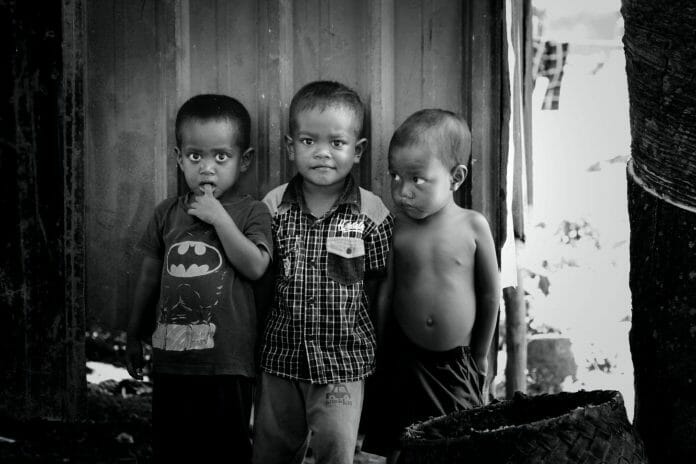
Published in AsiaNewsToday, image by The Nordic Page.
Race and religion have been and continue to be the twin “trump cards” deployed as a tool to divide and rule Malaysians by a certain breed of politicians. It means the politicisation of race and religion.
That is, these two “trump cards” are used for political mileage and ends.
The political rhetoric as shaped by the narratives or “pre-scripted” seek to reinforce the differences between the majority and minorities – instead of bridging the gap (due to pre-existing differences in culture, religion and worldview) as essential to nation-building.
The underlying narratives or “script” of the political rhetoric provides the justification for the “Other” (i.e., minorities as well as the members of the ethnic majority who hold to a different ethos and worldview) to be scapegoated and blamed, e.g., for the ills besetting the nation such as corruption (as the “majority” givers of bribes), poor governance/maladministration (such as the cuts in allowances to farmers and fishermen as an expression of oppressive tendencies vis-à-vis the majority community in the heartlands), moral decay (promotion of LGBTQ agenda and “yellow culture”), cultural dilution (with the emphasis of diversity and plurality, liberal secularism), etc.
The persistence of the dangerous mix of ethno-religious rhetoric takes place set against the backdrop of the diminishing numbers of ethnic minorities (in contrast to the majority).
Based on the Current Population Estimates Malaysia (2022) by the Department of Statistics (DOSM), the population of the major ethnic groups in Malaysia as of July 2022 are as follows:
- 69.9% Bumiputera (which includes the non-Malay Bumiputeras) – an increase of 0.3% from the previous year (2021: 69.6%);
- 22.8% Chinese (2021: 23.0%); and
- 6.6% Indians (2021: 6.7%).
The Bumiputera population as recorded in the Bumiputera Statistics (2022) as of December 6, 2022 is estimated at 21.13 million (male: 10.69 million; female: 10.44 million).
Now, the politicisation of race and religion precisely means that politics is corrupted by the selfish and venal and, not least, craven use of ethno-religious sentiments from the top down.
Racism and religious bigotry happen because politicians give free rein and expression to latent prejudices driven by base sentiments on the ground, instead “leading from the front” for self aggrandisement on the one hand and lack of political will and moral courage on the other.
Furthermore, power structures and institutions or otherwise the apparatus of the State can be deployed and directed towards a particular ethnic group solely because they’re not part of the majority, especially the marginalised who lack meaningful participatory role in mainstream life or are numerically insignificant and therefore lack the political capacity to wield and exert pressure and influence.
In other words, racism can be subaltern or in the form of a societal “underbelly”, i.e., hidden from mainstream life or rendered invisible precisely because of the marginalised status of these communities.
According to the Malaysia Racial Discrimination Report 2021 produced by Pusat Komas (a leading non-governmental organisation/NGO advocating on issues relating to discrimination and marginalisation in Malaysia), the largest percentage of incidents of racism, discrimination and xenophobia successfully identified last year were related to racial and religious politics which contributed 28%.
As part of the litany of empirical or documented evidence (albeit secondary sources via the media) of the double whammy of ethno-religious politicking, this specific category highlighted a news report dated January 19, 2021 whereby Abdul Hadi Awang (President of Pas) said that Perikatan Nasional (PN) and Muafakat Nasional (MN) should cooperate with his party in order to unite the Malays for otherwise, non-Muslims will dominate the country.
An example of race and religion being manipulated to appeal to the underlying chauvinistic sentiments already formed or conditioned (“tugging at the heartstrings”, as the late Lee Kuan Yew would say) of the base or core constituency (“heartlands”) as well as evoke and instil fear in the larger majority community.
This statement made by a prominent/pre-eminent Malay political leader also has the undertones of political supremacy based on race and religion which is popularly recognised as the natural and surest way to gain support from the majority community – a stumbling block to national unity and nation-building for it reinforces and deepens ethno-religious mistrust.
The second largest category was racial and religious provocations (23%).
The rest of the categories were:
- racial discrimination in the education sector;
- racism in the media and the Internet;
- racial discrimination in the business sector;
- racism and racial discrimination in other sectors; and
- xenophobia
All in all (i.e., inclusive of seven categories as altogether enumerated above), there were 53 incidents of racism and discrimination recorded in 2021 alone, which increased to more than double compared to the previous year in 2020 (21 cases).
The report indicates that the country’s level of racism, discrimination and xenophobia hasn’t decreased or subsided.
It will be challenging for Malaysia to progress very far and for all Malaysians to come together as one, united and indivisible people as long as racism persists in society.
We, as a nation, will always be held back by racial and religious politicking – hampering our full potential which includes brain drain as a critical factor and determinant.
The Durban Declaration notes that, “any [ideology] of racial superiority [or supremacy] is … false, morally condemnable, socially unjust and dangerous, and must be rejected [unequivocally] …”.
Such scenario arises due to lack of trust as a basic ingredient of human life.
It can’t be strongly emphasised enough that trust is an essential pre-condition and capital of any nation or society to survive and flourish. The absence or low level of trust – due to racial and religious politicking – can impede a nation or society from achieving deeper and more meaningful changes and reforms that promotes greater harmony and unity.
As is always the case, the political rhetoric (which expresses and exposes the mistrust/distrust of the “Other”) “percolates back” to the grassroots or “rank-and-file” who then become emboldened by contributing to the rising cases of racism and religious bigotry.
The report by Pusat Komas also documented that a fringe group known as “No Nonsense Netizens (N3)” has been attacking who they deem as “liberal” Malays and the non-Muslims with offensive and provocative remarks in the comments section of the Facebook pages of popular media outlets.
The recently concluded 15th general election (GE15) has also shown how even the youth, of all people, posted videos on TikTok inciting and threatening violence based on the classic May 13 threat.
This shows that we continue to face the challenge of forging and fostering genuine multiculturalism in our nation and society – one that’s free from the shackles of racial and religious politicking which only poisons the minds of the rakyat.
So, the politicians concerned should stop/cease promoting prejudice and suspicion among the ethnic communities as “familiar territory” and a “perfunctory” or habitual trait in an exercise of expressing one’s political identity/image and self-promotion, and instead push for inclusivity and togetherness as the way forward.
It’s reported in an article entitled “Youth campaign blasts multiple misuses of race and religion in GE15” published by Malaysiakini (November 8, 2022) that several candidates during the GE15 campaign season misused race and religion in creating disinformation, misinformation and mal-information to boost their campaign. These candidates manufactured fake issues and news – spectres of political, economic and social threats.
Thus, it’s recommended that the unity government be strict in coming down hard on incitement to racially and religiously seditious sentiments whether it involves politicians or individuals.
The unity government should implement a “zero tolerance policy” against any form of hate speech – racial and religious “defamation” or “libel” and rhetoric – online or offline.
The Sedition Act (1948) and even the Security Offences (Special Measures) Act (2012) or Sosma should be unequivocally applied without hesitation at anyone guilty of such conduct – which has the potential to inflame hatred and ill-will among the communities based on race and religion.
Instead of setting a bad form, politicians should be leading on the forefront as living exemplars, apostles and practitioners of the message and agenda of national unity and nation-building – by always and unrelentingly emphasising on the critical need to be and stay united as one Malaysian people.
If not politicians, who else are supposed to take the lead?
Our politicians should be at the forefront in promoting inter-ethnic and interfaith harmony – like in Singapore with its Inter-Racial and Religious Confidence Circles (IRCCs) which are essentially government-backed grassroots organisations.
Here in Malaysia, the Ministry of National Unity should take the lead and work with all members of Parliament and state legislative members as well as councillors to ensure that regular events are organised to strengthen inter-ethnic and interfaith relations at the grassroots level.
It should be made compulsory or mandatory for all politicians representing both parliamentary and state level constituencies to organise such events under the auspices of the same ministry, at least, e.g., on a yearly basis.
In short, politicians would then be able or compelled – as the case may be – to make use and harness a platform (similar to the IRCCS in Singapore) to promote national unity and cohesiveness.
Additionally, politicians can solidify and consolidate their outreach through access to other networks, structures and systems of grassroots organisations (federal, state, local).
As an example, there should be the formation of “citizens’ consultative committees” (CCCs) based on the Singaporean experience and enacted by an Act of Parliament for statutory empowerment that expands and deepens the political “connectivity” between the government and the rakyat.
The CCCs would be appointed by the federal government and serve as the umbrella body – at the parliamentary constituency level – that incorporate all grassroots organisations (including NGOs) in the respective localities. But the CCCs would be managed by civil servants and come under the Ministry for National Unity. This would serve as a check and balance against errant politicians (i.e., those misuse the racial and religious “trump cards”).
It’s critical that the battle and struggle against the scourge of narrow communalism and extremism begins with the rhetoric itself as propagated by the politicians concerned and as underpinned by the ideological narrative and script – for the simple reality that it’s akin to removing the tumour of a cancer.
Farah Natasya is Research Assistant at EMIR Research, an independent think tank focused on strategic policy recommendations based on rigorous research.

